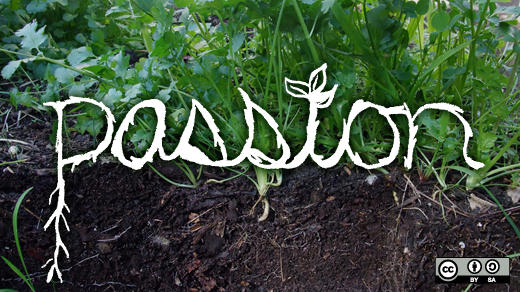Recently, Red Hat held a panel discussion for the North Carolina STEM (science, technology, engineering, and math) organization. There were lots of great conversations around education and how to prepare students for careers in technology. One recurring theme was passion.
The open source way tends to attract passionate people. It allows those who care enough to take matters into their own hands. In the world of open source, what counts is not so much who you are as it is what you have done. The phrase “actions speak louder than words” takes on even deeper meaning.
Teachers struggle with passion in the classroom. I overheard one teacher whisper: "You can't teach passion." Another teacher mentioned that some of the same behaviors that receive positive attention within the open source world--like hacking code or self-starting--are not appreciated or recognized in most classrooms (especially in K-12). Many curricula are so structured there isn't time to deviate. And this structure tends to reduce the chances of creating an environment that fosters passion.
I think back to my own K-12 days--I can't say I was extremely passionate about school. I was a good student, but that was because my parents expected me to work hard and I wanted to get good grades mostly for the sake of having good grades. It didn’t have a lot to do with an inner drive to learn.
It wasn’t until I was older and started interning that I realized I do enjoy learning. My learning style is very different from traditional learning methods. Traditional teaching puts a lot of emphasis on theory and memory: Read a chapter in a textbook, do a worksheet, discuss, take a quiz, take a test, review the test then repeat, ad nauseum. I learn best by doing and interacting; I am a very strong kinesthetic learner. I think I would have been a more inspired student if there had been more opportunity to do things—and build knowledge and opinions from those experiences versus memorizing chapters in a textbook.
It is the reflection above that leads me back to the comment, “You can’t teach passion.” I’m not sure whether or not you can literally teach it, but I do believe it can be nurtured. If the environment is ripe with opportunity and creativity, if the students participating do so openly and transparently, I believe passion can be grown and expanded. How? I have two suggestions—and both are based on principles from the open source way. Maybe you have more and/or different ideas?
1. Release early, release often.
To me, this alone would do wonders to a classroom environment lacking passion. Students would better understand that you don’t always get it right on the first try. It’s actually more likely that you won’t get it right on the first try which just means keep trying, keep learning, and keep collaborating until you do get it right versus a bad letter grade and no time to further explore the topic because you must start the next chapter.
2. Put down the grading pen. Collaborate more.
Today's grading system is more harmful than it is helpful—especially when you are trying to get students to invest in their own education, and connect to a life of continuous learning. I believe we should revisit and innovate on our current grading system.
From the start, most schools categorize students smart, average, or not-smart based on a letter grade. A bad letter grade feels personal—especially in K-12 when you are more insecure and unsure. You put your thoughts and answers on paper and when you get it back and there is a ‘D’ glaring at you, the effort seems wasted. And even worse, your peer to the right got a B+ and your peer to the left got an A-. Internal translation: “Geez, I’m dumb.”
Now, I am not saying we are being too hard on students by giving them a D--I don't believe that every student deserves a participatory medal or that some bad grades aren't earned. I am simply saying that our grading system, as it is today, doesn’t inspire children to want to learn, particularly those just beginning their education.
When we leave it to letter grades to tell young students if they are good or bad at something, it’s really hard to get beyond the grade and develop passion for learning. A bad letter grade—or repeated bad letter grades--prematurely spells it out for students: The results are in and, as it turns out, you are not a good student. Or, on the flip side, you get an A on a test, so you must be a great student. You must fully understand this topic.
Wait, does the student really understand the material or is he or she just good at memorizing? How do you know the difference? There is a difference, right?
The more you prototype and collaborate as a class or in groups, the more likely students will find the best answers or ideas. The more everyone will learn. It’s through the collaborative process that students will start to truly develop both a passion for and ownership in the learning process.
I invite you to share how you think one can go about creating an environment that nurtures passion when there is little to no room for any type of exploration or deviation from the mandated structure. Maybe you disagree with my two suggestions and want to tell me--that’s fine too. Hash it out in the comments below. You never know, your story could turn into an article.






8 Comments